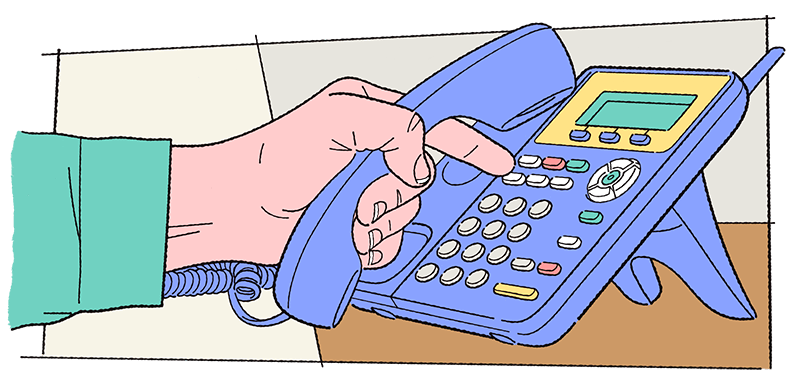6 Types of Call Centers – Definitions & 5 Reasons Your Business Needs One
- byGabby Rolette
- onAugust 8, 2024
- inCall Center 101

When thinking about the term “call center,” what is the first image that comes to mind? Like most people, you’re probably picturing a giant office full of operators, answering calls for big Fortune 500 businesses along the lines of Amazon or Walmart. While those companies do utilize call centers to assist with various customer service needs, such as complaints, returns, or product recalls, call centers can actually be a useful and cost-effective tool for any sized business, even the small mom-and-pop shop down the street.
With different types of call centers specializing in various tasks, such as inbound or outbound calling, “call center” is a broad term. Depending on a business’s specific needs and budget, they may benefit from utilizing one particular call center service over another. But how do you know what you need or when you need it? Let’s take a look at common call center models below, discuss the benefits of each, and provide some insight into why a call center may be just the thing to give your business a boost.
Types of Call Centers

Inbound call center
Inbound call centers are the most common call center, used by businesses of all sizes. They typically answer for multiple industries and offer generalized services, such as message taking, appointment scheduling, order entry, and emergency dispatch.
Like their name suggests, inbound call centers are designed to answer a business’s inbound calls and usually do not place focus on telemarketing or other specialized services. Additionally, inbound call centers often employ a general pool of operators that handle calls for a wide variety of businesses on any given day.
Benefits:
- Inbound call centers give businesses access to a larger pool of operators, which means lower queue times and more calls handled.
- Inbound call centers may have multiple pricing plans based on usage, providing a more cost-effective customer communications solution.
- Inbound call centers can handle just about any call type you can think of.
Outbound call center
Outbound call centers are most often used by businesses that want to outsource their telemarketing, cold calling, or B2B marketing plans. These centers may use predictive dialers and auto-dialing software, which allow the center to efficiently manage a large volume of calls while simultaneously cutting back on agent idle time and increasing productivity.
Outbound call center agents are trained in sales-generating techniques such as up-selling and cross-selling, as their main goal is to capture and convert leads into paying customers. However, businesses may also enlist the help of outbound call centers to assist with market research, customer surveys, and appointment reminders, giving in-office staff time to focus on other projects.
Benefits:
- Outbound centers can handle time-consuming tasks like cold calling, freeing up your internal team to handle other things.
- Outbound agents are skilled in up-selling and cross-selling tactics to help increase your ROI.
- Outbound call centers are usually PCI compliant, making it safe for agents to process e-commerce transactions.
Automated Call Center
An automated call center relies mostly on interactive voice response (IVR) systems to manage calls rather than routing them to live agents. Many businesses utilize IVR systems for simple selections like press 1 for English or 2 for Spanish, but they can be configured in a number of different ways to accommodate the needs of a particular business.
For example, a bank may work with an automated call center to assist callers who want to check their account balance or want information on their latest statement. A healthcare provider may utilize an automated call center to implement a date/time routing function that sends calls one way or another depending on the day or time. These centers can streamline customer service operations by using speech recognition and natural language processing, returning relevant responses based on the caller’s input.
Benefits:
- Automated call centers are generally budget-friendly, as there is no live agent cost to consider.
- Automated call centers give the caller the ability to assist themselves by navigating through an automated prompt.
- Automated call centers eliminate the possibility of human error.
Virtual Call Center
A virtual call center employs agents that work remotely, offering services such as outbound calling or dedicated agents in addition to inbound call handling. Call centers may combine a physical call center environment with a virtual agent component to help reduce overhead while allowing more flexibility in terms of scheduling and coverage. This hybrid model enables local agents to work in-office during regular business hours, while also employing remote agents who can cover late evening or overnight shifts based on their time zone.
Benefits:
- Virtual call center agents work remotely, so businesses are less vulnerable to disruptions caused by natural disasters, power outages, or other emergencies that may affect a centralized office.
- Virtual call centers allow businesses to easily scale their operations up or down depending on their needs.
- Virtual call centers can operate across different time zones, extending 24/7 support to their clients without having to pay overnight/overtime wages to in-house staff.
Dedicated Call Center
Dedicated call centers develop a personalized solution by providing dedicated agents to handle calls instead of a general pool of operators. Training agents to specialize in a handful of accounts allows them to gain insight into the operations of a particular business, creating the impression that the agents work directly for that business – which in turn gives callers a better customer service experience.
Understandably, pricing for dedicated call centers is more costly than standard inbound call centers. It takes a longer period of time and a detailed curriculum to get agents up to speed on the tasks and information that they will be responsible for on a daily basis. Dedicated agents are essentially an extension of a business, and businesses can usually dictate the agents’ hours to reflect their own coverage needs.
Benefits:
- Dedicated call centers give your business a personalized approach to customer communication.
- Dedicated call centers cost less than adding employees to your in-house team, ultimately reducing overhead expenses.
- Dedicated call centers allow you to be involved in recruitment and training processes, and you can control the hours that you’d like your dedicated agents to be available.
Omnichannel Call Center
Omnichannel call centers offer multiple methods of communication beyond phone calls. Services may include live chat, email response, and SMS messaging, and agents within an omnichannel call center can easily navigate from one communication channel to another without having to regather a customer’s information.
For example, a conversation may start on live chat and move to a phone call, or may start with an email and move to a text. The goal of omnichannel call centers is to leverage several forms of communication to build a seamless and personalized customer experience, creating a more convenient approach to the customer service process.
Benefits:
- Omnichannel call centers provide clients with multiple avenues of communication, generating more opportunities to resolve their customers’ concerns in whichever way is most convenient for them.
- Omnichannel call centers allow for consistency across communication channels. Clients who are speaking with an agent via live chat and then decide to call in won’t have to reiterate their needs.
- Omnichannel call centers offer enhanced agent productivity, as agents can handle all methods of communication within any given conversation.
Signs Your Business Needs a Call Center
Though businesses across innumerable industries can benefit from call center outsourcing, some business owners may look to outsourcing to refine operations, or to deal with specific issues or circumstances.
For example, small businesses without the resources or funds to hire more staff may have important tasks and projects falling by the wayside. Insurance companies may have an immediate need for call center services to deal with an influx of calls after a natural disaster, whereas a tax auditing firm may need to outsource during tax season to assist with overflow calls. Seasonal businesses like landscapers or non-profit organizations that are running telethons may need temporary assistance when their volume is expected to rise.
Essentially, any business trying to navigate a competitive marketplace, whether it’s online or operates out of a brick-and-mortar store, can utilize outsourcing to increase lead capture and conversion, improve customer retention, and most importantly, make customers happy. Here are a few of the telltale signs that your business needs a call center.
Phone calls are being missed
The number one reason businesses outsource to call centers is because they need help answering their phone calls. 70% of callers will move on to the next business if they reach voicemail, and most callers will not wait for more than 30 seconds if put on hold. People want to be helped as soon as possible, and it’s imperative for any business to be able to keep up with the demands of its client base.
Call centers ensure that all of your calls are being answered, and advanced call routing technology is constantly being developed to alleviate long queue times. Call centers that offer 24/7 live answering can give your business a live presence even after you’ve closed the doors for the evening, without depleting your funds. Whether customers are calling at 2am with a burst pipe, or on Christmas morning with a complaint that a product they purchased is ineffective, call centers are there to see to it that those customers are heard and assisted effectively.
Tasks aren’t being completed
Tasks like appointment scheduling and data management can be difficult for staff to complete consistently if answering calls and working with customers in-house are competing for their time. A call center that can take on these tasks for you will not only facilitate their completion, but that will free up your staff to focus on other projects that may need attention.
Many call centers can schedule appointments right on the software you already use, decreasing any scheduling errors or conflicts. Additionally, centers may offer the ability to integrate with apps to push data directly to your CRM or ticketing software, such as Salesforce or Zendesk, which means your staff won’t have to waste precious time doing double the work.
Your business is losing customers
Customers may stop working with a business for any number of reasons, including poor customer service experiences, financial concerns, competitive alternatives, issues with a product or service’s quality, and more. If your business is struggling to retain active customers, then it might be time to outsource to a call center.
Businesses that can’t keep up with customer service requests can look to call centers to answer calls, manage email or live chat responses, or take care of data entry. Customers that struggle to connect with a live person every time they have a service issue or billing question are going to grow frustrated and start looking to competitors that can prove they have a handle on things. Customers want to feel confident in where they spend their money, so it’s important that your business can stand up to the competition. A call center will help you do just that.
Leads are growing cold
Your sales team’s primary focus is most likely on inbound calls. But lead generation is about more than just phone traffic. It can be accomplished through many different means, including social media marketing, search engine optimization (SEO), direct mail campaigns, and cold calling, which means there is much more to consider, and much more that can be inadvertently overlooked.
If your sales team is too busy with incoming calls to spend time qualifying web leads, then you are sharply decreasing the likelihood of converting web leads into customers. By the time you reach out to them, they may have already signed on with a competitor. And if your reps are fracturing their focus into innumerable areas, it will be even harder to stay on top of hot leads while also managing the day-to-day. Outsourcing to an outbound call center can take some of the pressure off your in-house sales while also converting more leads into paying customers.
Lack of multichannel support
If your business is only assisting customers through one or two modes of communication, then you’re missing out on an opportunity to reach a much wider audience. With today’s technology, customers expect to be able to contact a business via every possible avenue, virtually at the touch of a button. A business that is accessible on multiple channels including live chat and social media can effectively engage more customers, offer real-time support, and cater to diverse preferences in communication, thus increasing overall customer satisfaction.
But what if there are no available resources for that pursuit, or what if you simply don’t have the budget for more employees? Outsourcing to a call center that offers omnichannel communications can be an economizing alternative, delivering consistent and responsive customer support across all platforms, without the overhead costs of additional in-house personnel.

Why Call Center Outsourcing Works
Call centers are an invaluable resource for businesses of all sizes across all industries, offering tailored solutions that cater to a variety of needs. Whether you’re grappling with high call volumes, aiming to enhance customer service across multiple channels, or seeking to streamline operations without expanding your in-house footprint, there’s a call center model designed to meet your needs. By understanding the different types of call centers and their specific benefits, you can make an informed decision that aligns with both your business goals and budget.
Get started with SAS. Free 14-day call center trial.

Live call center support grows brands.
24/7 live call center services let you engage with your customers around the click. Grow your business and strengthen your brand with SAS.










